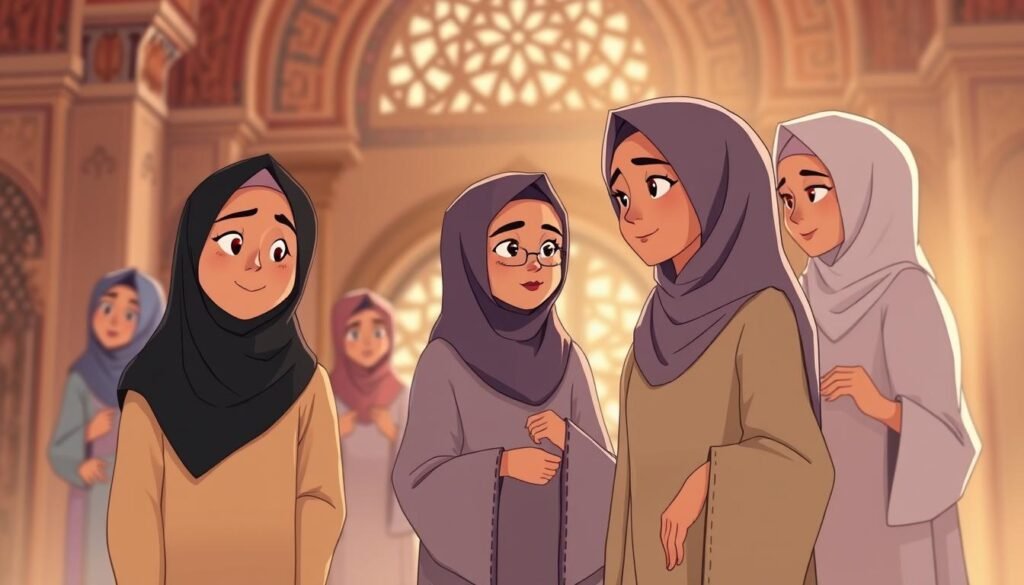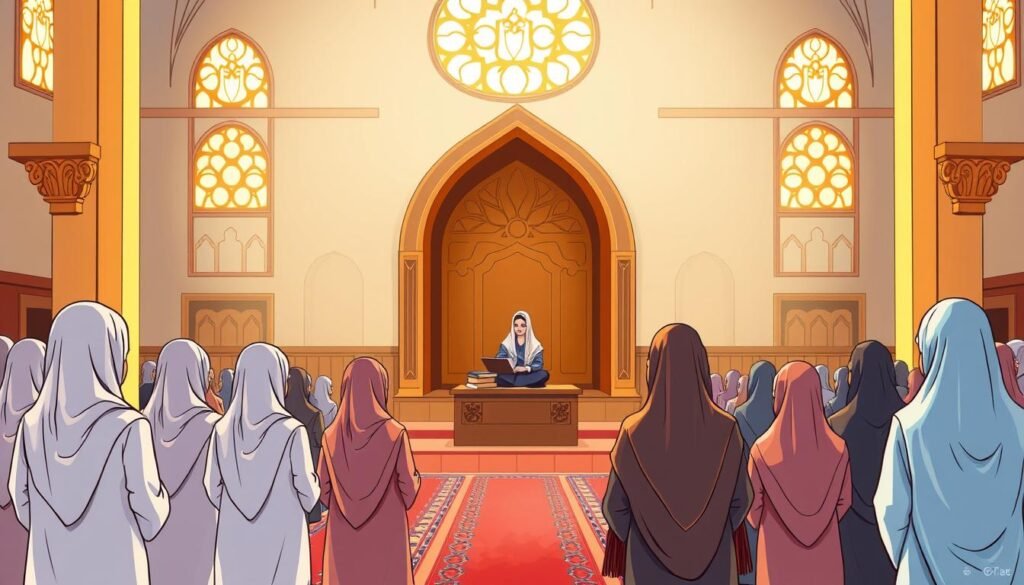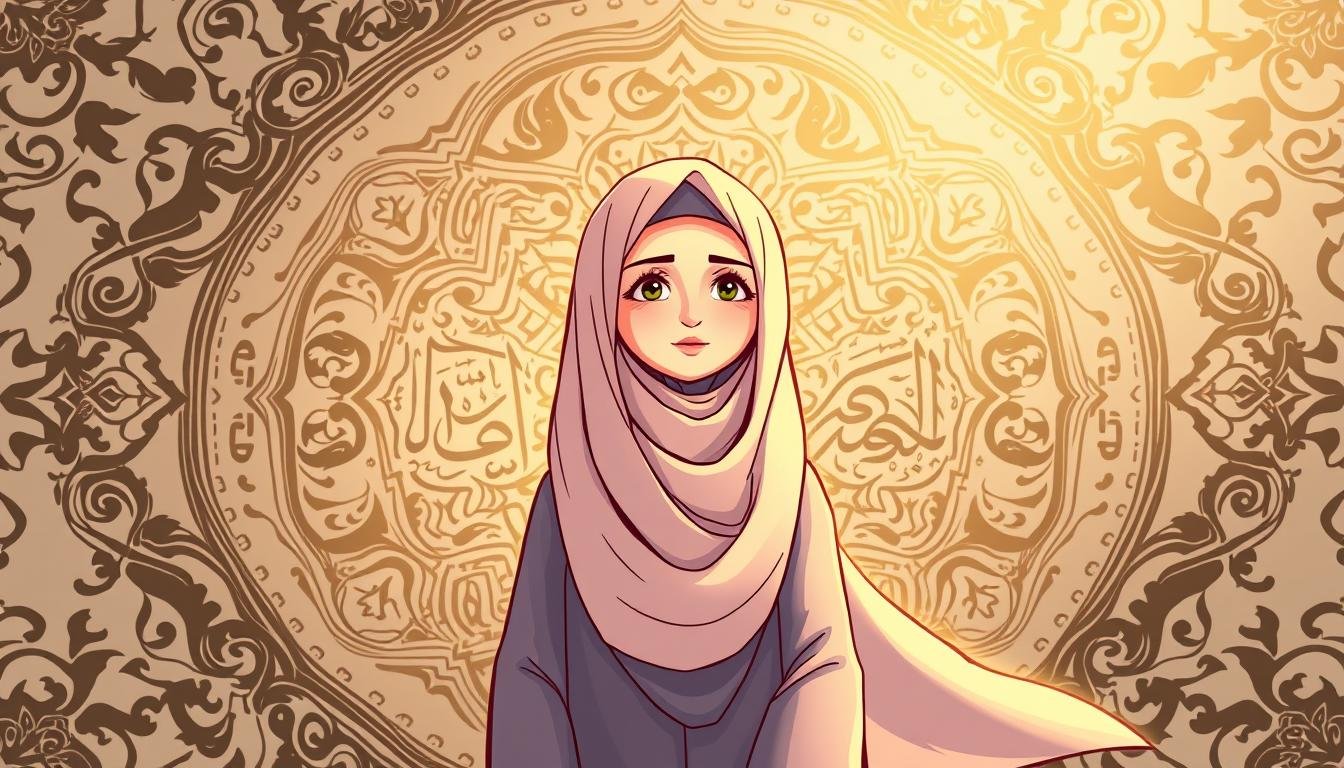Thinking about women’s rights in Islam makes me remember a key hadith. It talks about being kind to women. The Prophet Muhammad ﷺ said taking care of daughters can protect us from hell on Judgment Day. This shows how important it is to care for women.
Looking into hadith about women, we see the Prophet’s teachings were groundbreaking. They promoted respect, kindness, and equality. By studying the Prophet’s words and actions, we learn about the value of women in Islam. This helps us understand and improve women’s rights in our communities.
Understanding the Historical Context of Women in Pre-Islamic Arabia
In pre-Islamic Arabia, women’s roles were mainly in the family and tribe. This time, from 3500 to 3000 BCE, was very patriarchal. Women had few rights and were seen as property. Islamic teachings on women later changed this, recognizing their humanity and rights.
The Quran says, “So their Lord responded to them: ‘I will never deny any of you—male or female—the reward of your deeds. Both are equal in reward.'” (Aal `Imran 3:195) This verse shows God sees men and women as equal.
Prophet Muhammad’s views on women were also key. He taught kindness and respect towards women. His teachings on women’s rights and dignity changed society’s view of women. By looking at pre-Islamic Arabia and Prophet Muhammad’s views on women, we understand Islamic teachings’ importance today.
The Prophet’s Revolutionary Stance on Women’s Education
Looking into the Islamic view on women, we see the Prophet Muhammad (PBUH) was key in pushing for women’s education. The Quran says all Muslims, men and women, must seek knowledge. The Prophet said, “the scholar is better than the worshiper, like the moon is better than stars,” showing knowledge’s importance.
The Quran, like Surah Al-Alaq (96:1-5) and Surah Az-Zumar (39:9), urges us to read and learn. The Prophet’s teachings on women’s education have shaped history. For example, Fatima al-Fihri started the al-Qarawiyin Mosque and University in 859 C.E. It’s the oldest university, showing women’s role in education.
In the women’s status in Islam, education is key to empowerment. The Quran says everyone, men and women, should have equal education chances. It also says women can do business and have legal rights. The Prophet’s views on women’s education have greatly influenced their place in society.
Authentic Hadith About Women’s Rights and Dignity
Looking into the authentic Hadith about women’s rights and dignity shows us a lot. Women in Islam are treated with great respect and care. The Prophet Muhammad (peace and blessings be upon him) taught us to be kind to women, as Abu Hurairah (may Allah be pleased with him) shared.
This teaching shows the Islamic values on women. It stresses their well-being and dignity.
The Hadith talks about women’s lives in many ways. For example, women keep their identities, property, and dignity. A Muslim woman keeps her name after marriage, not taking her husband’s surname. These rights show the Islamic values on women. They aim to give women autonomy and self-respect.

The Prophet Muhammad (peace and blessings be upon him) also taught about social rights. Women can say no to unwanted marriages, own property, and get a divorce. These teachings have greatly helped women in Islam. They allow women to make choices about their lives and well-being.
By studying these authentic Hadith, we learn more about Islamic values on women. We see how they help with gender equality and social justice.
The Prophet’s Personal Treatment of Women
Looking at Prophet Muhammad’s life shows us his respect for women. He was close to his wife, sharing jokes and secrets. This shows how men should treat their wives with kindness and understanding.
The Prophet’s actions with women show his teachings on their rights. He trusted his wife Aisha with important teachings. He also treated his daughter Fatima with love and respect, showing the value of family in marriage.
The Prophet didn’t just treat his family well; he also let women go to the mosque. This shows his belief in women’s right to learn and pray together. By looking at how he treated women, we learn more about his teachings and their place in society.
Marriage and Family Life in Prophetic Traditions
Exploring Islamic teachings on women is fascinating. Prophet Muhammad’s views on marriage and family life stand out. He said, “the best of you is the one who is best to his wife.” This shows how important kindness and respect in marriage are.
In Islamic teachings, a wife is more than just a partner. She is a companion and friend. The Prophet’s teachings aim for a loving family environment. This shows Islamic teachings focus on balance and fairness in family life.
Prophet Muhammad also stressed the need for communication and trust in families. His teachings on marriage and family life help us understand women’s roles. These teachings promote love, respect, and understanding.
The teachings on women in Islam offer great insights for family life. Following these teachings can help build stronger, loving families. This leads to a more compassionate and fair society.
Women’s Leadership Roles According to Hadith
The debate on women’s leadership in Islam has lasted for centuries. It shows both old and new views. From an Islamic perspective on women, some hadiths are used to argue against female leaders. For example, a hadith says “A nation that appoints a woman as its ruler shall never prosper.” But scholars question its trustworthiness and meaning.
The women’s status in Islam is complex. There are many views on the Quran and hadiths. Some say men are better, but others believe men should help women. The story of Bilqis, the Queen of Sheba, is seen as a positive example of female leadership in Islam.

In conclusion, the talk about women’s leadership in Islam is complex. Different views and interpretations exist. As we try to grasp the Islamic perspective on women, we must look at history, today’s world, and the Quran and hadiths’ meanings.
Common Misconceptions About Women in Hadith
Exploring Islamic values on women, we must clear up common myths. Many believe women in Islam are oppressed and have no rights. But this is not true. Women in Islam have many rights and freedoms, like education, choosing their husbands, and owning property.
The Prophet Muhammad (s.a.w.) taught us to treat women with kindness and respect. He said women protect their families. This shows how important women are in Islamic society and how much they are valued. Islamic values on women come from the Quran and Hadith, guiding women’s rights and duties.
Yet, many people misunderstand women in Islam. It’s key to learn about Islam’s real teachings and women’s rights. This helps us challenge these myths and understand women in Islam
Approaching this topic with an open mind is vital. This way, we can better understand Islamic values on women. We can then support equality and respect for women in all areas of life.
The Prophet’s Defense of Women’s Honor
The Prophet Muhammad taught us to protect women’s honor. This is shown in the Hadith about women. He warned against hurting women’s rights. His words, “O Allah, [bear witness that] I sternly warn against violating the rights of the two weak folks: orphans and women,” show his dedication to their dignity and women’s rights in Islam.
The Prophet’s teachings on women’s honor have shaped history. They focus on equality and justice. The Quran says women have rights just like men, showing the need for respect and understanding. The Prophet’s words and actions have helped establish women’s rights in Islam, seeing women as capable and righteous.
The Prophet’s defense of women’s honor shows his belief in a fair and equal society. He taught us to value women’s dignity and rights. Reflecting on his teachings, we see how important it is to support women’s rights in Islam and respect everyone’s dignity.
Spiritual Equality in Prophetic Teachings
Looking into Islamic teachings on women, we see Prophet Muhammad’s views. He believed women have the same chance to grow spiritually. The Quran says both men and women face the same consequences for their actions, as in Quran 3:195. This shows they have an equal spiritual nature.
Both genders receive the “divine breath,” as the Quran mentions in Qur’an 15:29. This shows their spiritual connection is the same.
Women’s religious duties are important in Islam. The Quran says both men and women can get the same spiritual rewards. “But whoso does good works, whether male or female, and is a believer, such shall enter heaven…” (Qur’an 4:125). This shows they have the same chance for spiritual growth and rewards, no matter their gender.
For more on Islamic teachings on women, we can look at their rights and roles in society.
The idea of spiritual equality is linked to equal rewards for good deeds. The Quran says, “So their Lord responded to them: ‘I will never deny any of you—male or female—the reward of your deeds. Both are equal in reward.'” (Aal `Imran 3:195). This shows the importance of Islamic teachings on women and their equal chance for spiritual growth and rewards.
Modern Applications of the Prophet’s Teachings on Gender Relations
The Prophet’s teachings on women were groundbreaking for his time. He empowered women and showed them respect. This helps us today in understanding gender relations.
In today’s world, the Prophet’s teachings guide us to build strong relationships. Understanding interfaith relationships is key. It helps us see the challenges and chances for women and men.
The women’s status in Islam is often not understood. But the Prophet’s teachings highlight the need for mutual respect. Recognizing women’s rights helps us build a fair society. We must apply the Prophet’s teachings with empathy and respect.
Embracing the Prophetic Legacy for Women’s Empowerment
The Prophet Muhammad’s (peace be upon him) teachings on women’s rights are a beacon of hope. His teachings show women’s humanity and their rights in a way that was new back then. This was a big change from the bad situation of women before Islam.
The Prophet’s actions towards women were always kind and fair. He stood up for their honor and believed in their spiritual equality. Women like Khadija and Aisha became leaders and made big contributions because of his teachings.
Today, women in many places are not treated fairly. We must follow the Prophet’s teachings to fight for women’s rights and dignity. By doing this, we can create a society that values and respects women’s roles in Islam.
FAQ
What is the significance of understanding the Prophet’s teachings on women?
How did the social, cultural, and economic factors of pre-Islamic Arabia influence the status of women?
What was the Prophet’s stance on women’s education?
What do the authentic Hadith reveal about women’s rights and dignity in Islam?
How did the Prophet’s personal treatment of women reflect his teachings on women’s rights and dignity?
What were the Prophet’s teachings on marriage and family life?
What were the Prophet’s teachings on women’s leadership roles?
How have common misconceptions about women in Hadith been addressed?
How did the Prophet defend the honor and dignity of women?
What is the significance of the Prophet’s teachings on spiritual equality?
How can the Prophet’s teachings on gender relations be applied in contemporary contexts?

Embracing Faith, One Insight at a Time!
The teachings of the Quran have always guided my path. With a deep passion for Islamic knowledge, I strive to blend the wisdom of tradition with the relevance of today, making the timeless messages of Islam accessible and meaningful for everyone.
Muslim Culture Hub is my platform to share historical insights and thought-provoking articles, exploring both well-known and lesser-discussed aspects of Islamic culture and beliefs. My mission is to create an inclusive online space where everyone can learn, strengthen their faith, and connect with the profound message of Islam.
Join the journey!
May peace be upon you.








